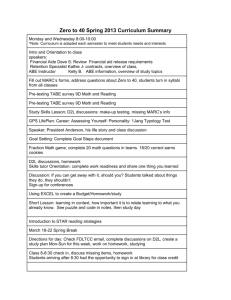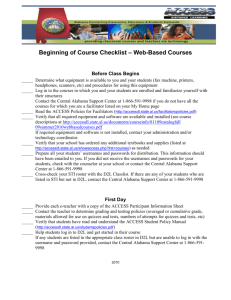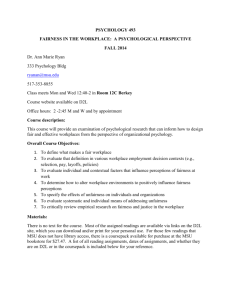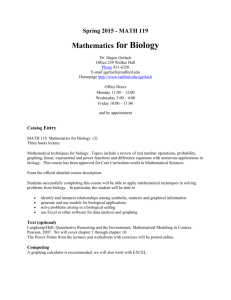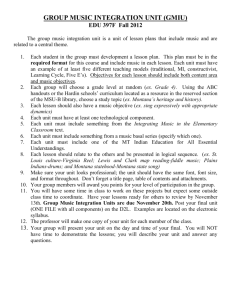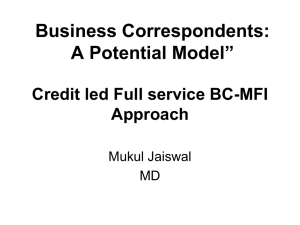psychology 493
advertisement
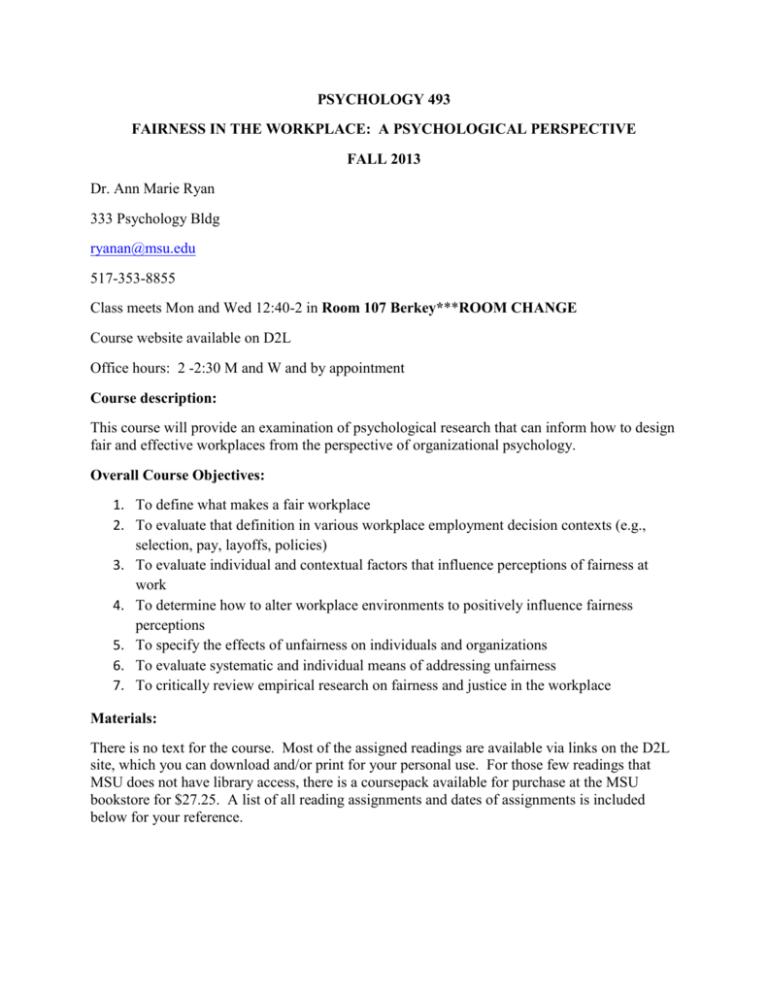
PSYCHOLOGY 493 FAIRNESS IN THE WORKPLACE: A PSYCHOLOGICAL PERSPECTIVE FALL 2013 Dr. Ann Marie Ryan 333 Psychology Bldg ryanan@msu.edu 517-353-8855 Class meets Mon and Wed 12:40-2 in Room 107 Berkey***ROOM CHANGE Course website available on D2L Office hours: 2 -2:30 M and W and by appointment Course description: This course will provide an examination of psychological research that can inform how to design fair and effective workplaces from the perspective of organizational psychology. Overall Course Objectives: 1. To define what makes a fair workplace 2. To evaluate that definition in various workplace employment decision contexts (e.g., selection, pay, layoffs, policies) 3. To evaluate individual and contextual factors that influence perceptions of fairness at work 4. To determine how to alter workplace environments to positively influence fairness perceptions 5. To specify the effects of unfairness on individuals and organizations 6. To evaluate systematic and individual means of addressing unfairness 7. To critically review empirical research on fairness and justice in the workplace Materials: There is no text for the course. Most of the assigned readings are available via links on the D2L site, which you can download and/or print for your personal use. For those few readings that MSU does not have library access, there is a coursepack available for purchase at the MSU bookstore for $27.25. A list of all reading assignments and dates of assignments is included below for your reference. Attendance Policy Attendance is expected at classes. This is an upper level class and thus it is expected that you will be engaged in discussion and interactions with classmates. In-class participation is part of one’s grade, and in-class exercises will be turned in towards a grade. Grading criteria: Final grades will be based on the following: Points Justice audit project 100 Indepth assignments (7 at 20 points each) 140 Prework short notes and discussion posts (15 for 5 pts each) 75 In class participation (up to 15 at 3 points each) 45 Total 360 Grade cutoffs 324 points and above 4.0 306-323 points 3.5 288-305 3.0 270-287 2.5 252-269 2.0 234-251 1.5 216-233 1.0 Below 0.0 In class participation points. Calculation of credit for class participation takes into account the likelihood that you may miss several classes due to illness or emergencies. There are 3 participation opportunities per class during 20 separate classes this term, yet you need only get 15 of those to get full points. Points are given for participating and completing work. Points will be assigned on the scale below To be clear, if you miss class, this scale is very generous in allowing for such events. It also means that there is no value in attempting to talk your way into more points at the end of the term. Extra credit There are no extra credit opportunities –there are multiple opportunities for you to improve your grade. Late or missed assignments. Handing in assignments later than the start of class on the date due is not acceptable. Late assignments ARE NOT ACCEPTED. Note that the D2L dropbox for assignments automatically stops taking submissions within minutes of the start of class on dates when assignments are due – do NOT wait until the last minute to submit the assignment. Grade posting Grades will be posted in a timely fashion. It is your responsibility to check the posted grades throughout the term for accuracy. Academic Honesty: Article 2.3.3 of the Academic Freedom Report states: “The student shares with the faculty the responsibility for maintaining the integrity of scholarship, grades, and professional standards.” In addition, the psychology department adheres to the policies on academic honesty specified in General Student Regulation 1.0, Protection of Scholarship and Grades; the all-University Policy on Integrity of Scholarship and Grades; and Ordinance 17.00, Examinations. (See Spartan Life: Student Handbook and Resource Guide and/or the MSU Web site www.msu.edu.) Therefore, you are expected to complete all course assignments without assistance from any source. You are expected to develop original work for this course; therefore, you may not submit course work you completed for another course to satisfy the requirements for this course. Students who violate MSU rules may receive a penalty grade, including but not limited to a failing grade on the assignment or in the course. Specific to this course, plagiarism of an assignment results in a zero for that assignment. Attempting to gain participation points for someone is not in attendance in class (handing in work with the name on it of someone not in attendance) or in other ways misrepresenting completion of the participation requirement results in a 0.0 final course grade (i.e., failure in the class, not just on the requirement points). Instructor Availability: While I do have set office hours, I am available to meet with students at other times by appointment. However, my schedule is a full one and so dropping by may not be the best strategy – please email to schedule appointments. I do check email frequently. Also, a little common courtesy in your email is more likely to generate an equally courteous and timely response. Classroom Rules of Conduct Cell phones must be turned off before class starts. Individual conversations outside of set discussion are disruptive to other learners – if you are disruptive, you will be asked to leave the class. The course is structured to encourage discussion and interaction – please treat other members of the class with courtesy and respect. Texting, emailing, game playing, and web surfing during class are counterproductive to learning, lessen your capacity to engage with those around you, and can be rude. Leave the outside world outside of class and be fully present. If for some reason you must arrive late or leave early (e.g., illness, car trouble), please take a seat near the door and minimize disruption of others with your arrival/departure. While I do not mind beverages in class, please refrain from eating unless you have enough to share with everyone. Online expectations D2L is new to me and to many of you as well so please be patient with any snags or missteps. Some assignments will require you to post to a discussion board your thoughts and ideas. While I encourage you to be yourself in your expressions, I also expect courtesy and respect for others. Please refrain from language that others might find offensive. There are topics we will discuss where individuals may have very different opinions and views – please express your dissenting viewpoint diplomatically. Accommodations If you have a disability that will require accommodations, please see me the first week of class. If you will miss class for a religious observance, let me know in advance. Emergency Procedures If an emergency should occur that would require the cancellation of class, I will send an email via D2L. Tips for Success This is not a class of lecturing – class time will be spent on integration with the assumption that you are coming to class prepared. Some hints for being successful: Read any assignment BEFORE class. Finish the assignments early Ask questions. Share your own experiences. Be engaged– you get more if you give more. Tentative course schedule (this schedule is subject to change) Date August 28 Sept 4 Sept 9 Topic Overview What is Fair? Org Justice Theory: components Sept 11 Org Justice Theory: antecedents Sept 16 Org Justice Theory: outcomes Sept 18 Org Justice Theory: outcomes Sept 23 Culture and fairness Sept 25 Sept 30 Oct 2 Oct 7 Oct 9 Oct 14 Oct 16 Legal definitions of fairness Legal definitions of fairness Fair Labor Practices Guest, Megan Huth, Google Fairness in hiring practices Fairness in hiring practices Fairness in pay and recognition Oct 21 Fairness in pay and recognition Oct 23 Fairness: layoffs and mergers Oct 28 Oct 30 Fairness: terminations Technology and performance monitoring policies Policies on when, where & how much work Nov 4 Nov 6 Appearance & Behavior policies Nov 11 Safety & Health policies Nov 13 Accommodations and exceptions Reading/Assignment Interview assignment due Cropanzano et al; Brockner et al readings Kim & Mauborgne reading Greenberg workplace status reading Bies reading Social media assignment Bowen et al reading Masterson reading Bobocel reading Audit focus due Culture blogs exercise Wired reading EEO assignment Von Bergen reading Watch TED talk Discussion posts for Audit feedback Criminal background assignment Davidson et al reading Greenberg pay cut reading Yaccino & Cooper reading Maximum wage reading Sandberg reading Perlin reading Audio on rewards Melokonian et al reading Audit final plan due Repa reading Scenario evaluation assignment Grandey reading; Moore reading Telecommuting assignment Stephenson reading Kimmel reading Konovosky & Cropanzano reading Listen to Wellness program Colias reading Prottas reading Collela reading Nov 18 Nov 20 Guest, Valerie Meder, Subway Accommodations and exceptions Nov 25 Preferences Nov 27 Addressing unfairness: individual managers Addressing unfairness: systems approaches Dec 2 Dec 4 Dec 9 Audit discussions Final exam meeting 12:45-2:45 Semple reading Kelly reading Pregnancy audio 40% quota link Networks audio Folger & Cropanzano reading Part I Folger & Cropanzano reading Part II Greenberg smoking ban reading Truxillo et al reading Audit projects due LIST OF READINGS (note on whether on D2L or in coursepack) 9/9: Cropanzano, R., Bowen, DE, Gilliland, WS (2007) The management of organizational justice. Academy of Management Perspectives, 301-48 (link on D2L) 9/9: Brockner, J. (2006). Why is it so hard to be fair? Harvard Business Review, (link on D2L) 9/11: Kim, WC & Mauborgne, R 1997. Fair process: managing in the knowledge economy, Harvard Business Review. (link on D2L) 9/11: Greenberg, J. (1988). Equity and workplace status: A field experiment. Journal of Applied Psychology, 73(4), 606-613. (link on D2L) 9/16: Bies, R.J. & Tripp, T.M. (2005). Badmouthing the company: bitter employee or concerned corporate citizen? In R.E. Kidwell & C.L. Martin (Eds.) Managing organizational deviance. Thousand Oaks, CA: Sage Publications p 97-108 (in coursepack) 9/18: Bowen, DE, Gilliland SW & Folger R (1999). HRM and service fairness: how being fair with employees spills over to customers. Organizational Dynamics, 27,p7-23. (link on D2L) 9/18: Masterson, S.S. (2001). A trickle-down model of organizational justice: Relating employees' and customers' perceptions of and reactions to fairness. Journal of Applied Psychology, 86, 594-604. (link on D2L) 9/18: Bobocel, D. R. (2013). Coping With Unfair Events Constructively or Destructively: The Effects of Overall Justice and Self-Other Orientation. 9/23: http://www.wired.com/wiredscience/2010/03/evolution-of-fairness/ (link on D2L) 9/30: Von Bergen, CW (2008). The times they are a-changing: Family responsibilities discrimination and the EEOC Employ Respons Rights J 20: 177-194. (link on D2L) 10/14: Davison, HK, Marasit CC Hamilton RH & Bing MN (2012) To screen or not to screen? Using the internet for selection decisions. Employee Rights and Responsibilities Journal, 24, 121. (link on D2L) 10/16: Greenberg, J. (1990). Employee theft as a reaction to underpayment inequity: The hidden cost of pay cuts. Journal of Applied Psychology, 75(5), 561. (link on D2L) 10/16: Yaccino, S. & Cooper, M. (2013). Cries of betrayal as Detroit plans to cut pensions. The New York Times, July 21. (link on D2L) 10/21: Sandburn, J. (2012). The beginning of the end of the unpaid internship. Time.com, May 2 (Link on D2L) 10/21: Perlin, R. (2013). Unpaid interns: silent no more. The New York Times, July 20. (link on D2L) 10/23: Melkonian T Monin P & Noorderhaven NG 2011 Distributive justice, procedural justice, exemplarity and employees’ willingness to cooperate in M&A integration processes: an analysis of the Air France-KLM merger, Human Resource Management, 50, 809-837. (link on D2L) 10/28: Repa, B.K. (2010) Your Rights in the workplace. NOLO. Ch 9 Losing or Leaving a Job. P 324-335 only. (in coursepack) 11/4: Grandey, A.A. Family-friendly policies: organizational justice perceptions of need-based allocations. In R. Cropanzano (Ed.). Justice in the workplace: from theory to practice, Volume 2. Mahwah NJ: Lawrence Erlbaum. P151-168 only. (in coursepack) 11/4: Moore, M. (2011, 05). Jimmy john's workers 'quarantine' sandwich shop. Industrial Worker. (link on D2L) 11/6: Konovsky, M.A. & Cropanzano, R. (1993). Justice considerations in employee drug testing. In R. Cropanzano (Eds.). Justice in the workplace: approaching fairness in human resource management. Hillsdale, NJ: Lawrence Erlbaum.p 181-188 only. (in coursepack) 11/6: Stephenson, C. (2010). Dress policies for law firms and their clients. Lawyers USA, (link on D2L) 11/6 Kimmel, M (2013). Fired for being beautiful. NY Times. (link on D2L) 11/11: Colias, M. (2009) Get Healthy or Else?: Crain's Chicago Business 32.17 (Apr 27): 2. (link on D2L) 11/13: Prottas, D.J. 2012 The vampire in the next cubicle: the Americans with Disabilities Act and the Undead, Employee Responsibilities and Rights Journal, 24, 9-89 (link on D2L) 11/13: Colella, A 2001 Coworker distributive fairness judgments of the workplace accommodation of employees with disabilities, Academy of Management Review, 26, 100-116. (link on D2L) 11/20: Semple, K. (2013). A Somali influx unsettles Latino Meatpackers. In M. Adam, W.J., Blumenfeld, C. Castaneda, H.W Hackman, M.L. Peters, & X. Zuniga (Eds). Readings for diversity and social justice (3rd edition) New York: Routledge. P 286-289. (in coursepack) 11/20 Kelly, EP 2008 Accommodating religious expression in the workplace. Employee Responsibilities and Rights Journal, 20, 45-56. (link on D2L) 11/27 and 12/2: Folger, R. & Cropanzano, R. (1998). Ch 6: Organizational justice and conflict management: social accounts, third parties, and grievance systems. In Organizational Justice and Human Resource Management. (in coursepack) Read 133-156 on 11/27 Read 156-172 on 12/2 12/2: Truxillo, D. M., Bauer, T. N., & Campion, M. A. (2009). Organizational justice interventions: Practicalities, concerns, and potential. Industrial and Organizational Psychology: Perspectives on Science and Practice, 2(2), 211-214. (link on D2L) 12/2: Greenberg, J. (1994). Using socially fair treatment to promote acceptance of a work site smoking ban. Journal of Applied Psychology, 79(2), 288. (link on D2L) Journal of Applied Psychology 05/2013;

